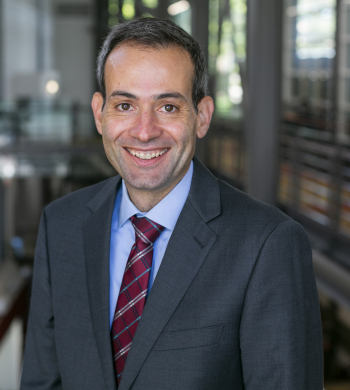Yaron Nili, scholar of corporate and securities law, joins Duke Law faculty
Nili’s research focuses on corporate governance, boards of directors, hedge funds, and private equity

Yaron Nili, a scholar and teacher of corporate law, corporate governance, and securities law, joined Duke Law School on July 1 as a professor of law.
Most recently, Nili was a professor of law and the Smith-Rowe Faculty Fellow in Business Law at the University of Wisconsin Law School. His research is focused on traditional corporate governance, boards of directors, and hedge funds and private equity.
In the fall semester he will teach Securities Regulation and Governance, Leadership, and Diversity in the Boardroom, and in the spring he will teach Mergers & Acquisitions and the Corporate Governance and Deals Lab.
“We are incredibly lucky to have Yaron Nili join our faculty. He is one of the world’s leading scholars of corporate governance, and his work is read and cited by everyone in the field,” said Elisabeth de Fontenay, the Karl W. Leo Distinguished Professor of Law. “Yaron is brilliant at identifying patterns and developments in corporate governance that others have missed, and I learn something new and important every time I read his work. And given his experience and collegiality, he will be a wonderful resource for our students.”
Nili already has strong ties to Duke. In 2021, he was a visiting professor at Duke Law, and he and de Fontenay collaborated on Side Letter Governance, 100 Washington University Law Review 107 (2023).
“I’m excited to join the ranks of so many people doing important work on corporate law and securities law. Joining a faculty that has so many people doing work that’s either directly what I do or adjacent to what I do is really exciting,” Nili said.
Nili earned his LLB and an MBA in finance from The Hebrew University in Jerusalem, where he was editor-in-chief of the Hebrew University Law Review. He clerked for Justice Ayala Procaccia on the Supreme Court of Israel before attending Harvard Law School, where he studied as a Fulbright Fellow, receiving his LLM degree. Nili spent two years at Simpson Thacher in New York as a corporate associate, representing financial institutions and other companies in commercial lending transactions, mergers and acquisitions, and securities, before completing his SJD at Harvard.
“I’ve really enjoyed getting to know some of the students and the passion that students at Duke have for corporate law,” Nili said.
Nili said he looks forward to the interdisciplinary opportunities at Duke, including potential collaborations with colleagues at Duke’s Fuqua School of Business.
“I’m definitely excited for the fact that Duke has such a great business school that does a lot of work in my wheelhouse,” Nili said.
Nili said his work in private practice was crucial to making him a more effective researcher. Five of his recent articles have appeared among the top 10 corporate and securities law articles of the year, as selected by scholars in the field.
“Both my research and teaching are heavily influenced by what’s on the ground,” Nili said. “We call it ‘law in action.’ Good research cannot just be about notions that don't really translate to what's going on — either because that's not the case on the ground or it's not going to be practical. So my work is really always connected to what is going on and trying to understand how things are happening on the ground.”
His law firm experience also opened his eyes to gaps in legal education that he could help fill. Nili is passionate about teaching and educating the next generation of lawyers, incorporating technology into his classes and focusing on connecting legal theory to practice.
“When I went on the academic job market, I was really intent on making sure that my classes are not just steeped in theory, but also have lots of practical elements to it,” he said.
“It's important to understand how that theory translates to actual day-to-day work of an attorney because that’s what most of the students will do. They’re not going to be professors, they’re going to be lawyers, in-house counsel. And I feel like our job as professors is to prepare them for that role.”